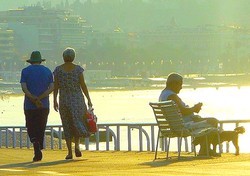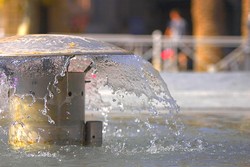The thermometers in Nice have been put to the test these past few days. The skies have been exceptionally azure and the sun bright enough to rival exotic destinations worldwide. However, with heat comes the challenge of enduring it. And the human body has its limits in regulating its own temperature. Thus, the most vulnerable individuals (the elderly, disabled, isolated, or children) are severely impacted by the effects of the sun. Heat strokes and sunstrokes are particularly common in this season.
While a full-fledged heatwave has not yet struck Nice, temperatures are hovering around 30°C, potentially impacting health. The summer of 2003 left an indelible mark in people’s minds. It is to prevent a repeat of that scenario that, starting in 2004, the government implemented the Heatwave Plan. This plan is managed by the town halls of municipalities and community social action centers.
The primary goal of the Heatwave Plan is to prevent situations of extreme isolation. To this end, an official and confidential register has been created in each municipality. The city of Nice currently has 700 people listed. This register contains the contact details of vulnerable and isolated individuals. To be included on the register, one simply needs to apply for registration (see below the procedure to register in one’s municipality).
A plan based on three levels
The first mission of the Community Social Aid Center is to ensure that these individuals are well.
The Heatwave Plan is structured into three alert levels.
The first, the seasonal vigilance level, is automatically activated from June 1st each year, with the onset of the summer temperatures and remains in place until August 31st. In Nice, level 1 is thus activated. As explained by Joëlle Martinaux, deputy mayor in charge of Social Affairs and Solidarity: “This level is essentially a preparatory stage for a probable heatwave.”
During the two summer months, teams of about ten young people comb the beaches frequented by seniors and the accessible beaches to promote sun safety awareness and provide assistance to vulnerable persons “by offering them drinks, for example,” explains Joëlle Martinaux.
The second, the warning and action level, is triggered by the regional prefects when weather conditions necessitate it. “It has never been triggered since the creation of the Heatwave Plan,” according to the deputy mayor.
Once this level is surpassed, the official register is used: “We must contact seniors daily, either by phone or in person, to check on their health and remind them about hydration rules.”
Finally, the third level, called maximum mobilization, is triggered by the Prime Minister if the heatwave is exacerbated by external factors such as drought, a shortage of potable water, or saturation in hospitals.
The Heatwave Plan, as Joëlle Martinaux explains, relies on “a solidarity chain between citizens, particularly the elderly.” She reminds the people of Nice to “report the absence of an elderly person they usually see or seniors in situations of isolation.”
Follow basic recommendations
While the Heatwave Plan is currently not in full effect, the risks associated with overexposure to heat are very real. In nursing homes, where residents are particularly vulnerable, monitoring is intensified. Dr. Augier, from the Nice nursing home “La Clairière,” explains: “We try to keep people as cool as possible. There are several air-conditioned rooms, including one main room in the facility. We also closely monitor our residents’ hydration.”
When it’s hot like these past days in the region, it’s best to follow basic recommendations.
To avoid heatstroke, it is strongly advised to drink regularly, and take cool showers or baths several times throughout the day. “Older people might not necessarily feel thirsty. Therefore, it is essential to offer them a drink systematically,” explains the deputy mayor for social affairs in Nice.
It’s also recommended to spend at least two hours a day in cool places. If air conditioning is not available in your home, you can visit public air-conditioned places (stores, cinemas, or town halls). It is also advised not to go out during the hottest hours. Shaded areas are obviously preferred.
Caps and other hats are also essential under this scorching sun.





